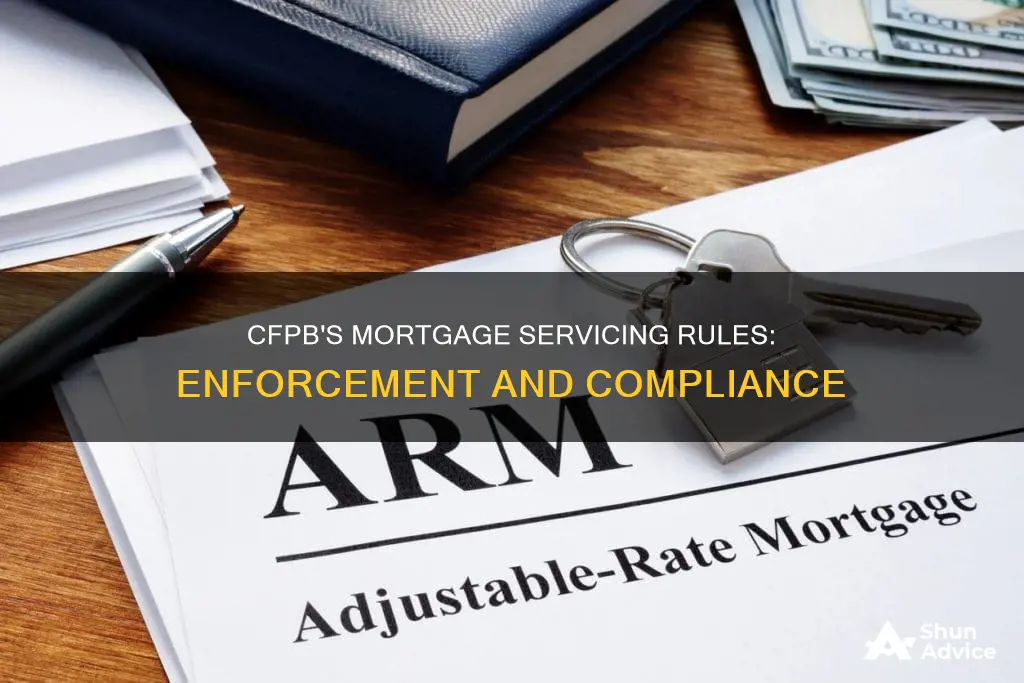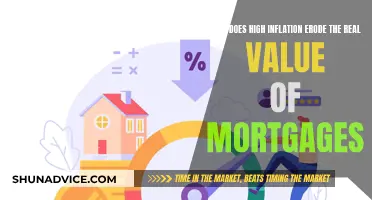
The Consumer Financial Protection Bureau (CFPB) is responsible for enforcing the Mortgage Servicing Rules, which aim to protect consumers and ensure fair, transparent, and competitive markets for financial products. In July 2024, the CFPB proposed new rules to help homeowners struggling with mortgage payments and to prevent foreclosures. These rules focus on assisting borrowers and improving communication with homeowners, while also addressing issues like junk fees and language barriers. The CFPB seeks to streamline the mortgage servicing process, particularly for borrowers facing payment difficulties, and has requested public feedback on these proposals. The CFPB's role in enforcing mortgage servicing rules intersects with the Fair Debt Collections Practices Act (FDCPA) and the Dodd-Frank Wall Street Reform and Consumer Protection Act, which amended the Real Estate Settlement Procedures Act (RESPA) and the Truth in Lending Act (TILA).
What You'll Learn

Loss mitigation
The Consumer Financial Protection Bureau (CFPB) has issued several rules and regulations regarding mortgage servicing, with a particular focus on protecting borrowers and ensuring fair practices. One key area of concern is loss mitigation, which has seen significant changes in the CFPB's recent updates.
The CFPB's rules outline specific procedures that servicers must follow regarding loss mitigation. One important aspect is the requirement to notify borrowers when their loss mitigation applications are complete. Servicers must provide written notice within 5 days (excluding weekends and holidays) of receiving a complete application. This is a crucial protection for borrowers, as it triggers certain safeguards, such as prohibiting servicers from conducting a foreclosure sale during the review process.
Early Intervention and Short-Term Options
The CFPB's rules also emphasize early intervention and providing short-term loss mitigation options. Servicers are permitted to offer short-term payment forbearance or repayment plans based on incomplete applications. If a borrower accepts a short-term plan, the servicer must provide written notice of the specific terms and inform the borrower about other potential loss mitigation options. Additionally, servicers are required to promptly notify potential successors in interest and facilitate communication with them regarding the property.
Transparency and Accessibility
The CFPB's principles aim for transparency and accessibility in loss mitigation options. Consumers should have easy access to clear and concise information about loss mitigation options and how to apply for them. This includes ensuring that repayment plans and loan modifications are affordable and sustainable for borrowers.
Post-Pandemic Changes
In July 2024, the CFPB proposed significant changes to its loss mitigation framework, moving away from an application-based system to one centered on foreclosure procedural safeguards. These changes aim to modernize the existing framework and address the challenges of the post-pandemic era. The new rules also address issues such as limiting fees during the loss mitigation review cycle and improving communication for borrowers with limited English proficiency.
Bankruptcy and Your Mortgage: Chapter 7 Discharge Explained
You may want to see also

Foreclosure procedural safeguards
On July 10, 2024, the Consumer Financial Protection Bureau (CFPB) issued a proposed rule to amend Regulation X, which governs default-servicing and loss mitigation procedures. This proposal includes significant changes to foreclosure procedural safeguards, which aim to protect homeowners from foreclosure actions and ensure proper evaluation of loss mitigation options.
The new procedural safeguards would prevent a servicer from initiating or advancing the foreclosure process unless specific conditions are met. Firstly, the servicer must have reviewed the borrower for all available loss mitigation options, and no viable option remains. Secondly, the borrower must not have communicated with the servicer for at least 90 days, despite the servicer's regular attempts to discuss the loss mitigation review. These safeguards ensure that foreclosure is a last resort and that borrowers are given ample opportunity to explore alternatives.
Additionally, the CFPB's proposed rule expands the requirements for determination notices. Servicers must now provide detailed written notices for all types of loss mitigation decisions, including offers, denials, forbearances, and deferrals. These notices must include reasons for the determination, inputs used, and all available loss mitigation options presented by the investor. This enhanced transparency enables borrowers to understand the factors considered in the decision-making process and explore alternative options.
The COVID-19 pandemic also brought about new procedural safeguard rules, which posed significant compliance challenges for mortgage servicers. These rules allowed for new foreclosure actions against unresponsive borrowers, requiring servicers to maintain comprehensive records demonstrating the absence of communication from borrowers during relevant time periods. This aspect of the rule presented challenges, as servicers had to prove a negative—that no contact occurred. Acceptable records to satisfy this requirement included call logs, servicing notes, and transaction schedules associated with the mortgage loan account.
Building Bridges: Mortgage Intermediaries and Estate Agents
You may want to see also

Servicer policies and procedures
The Consumer Financial Protection Bureau (CFPB) is responsible for enforcing federal consumer financial law and ensuring fair, transparent, and competitive markets for consumer financial products. The CFPB's mortgage servicing rules aim to protect consumers and provide guidance to the mortgage industry.
Loss Mitigation Options
Servicers must have policies and procedures in place to evaluate borrowers for loss mitigation options. This includes identifying all possible loss mitigation options available to the borrower and applying any specific eligibility thresholds established by the owner or assignee of the mortgage loan. Servicers must also keep records of relevant information, such as the date, terms, and features of loan modifications, to ensure transparency and compliance.
Communication and Notifications
Prompt and effective communication is essential. Servicers should have procedures to facilitate communication with potential or confirmed successors in interest upon receiving notice of the borrower's death or transfer of the property. Additionally, servicers must be able to promptly determine the documents required to confirm the identity and ownership interest of potential successors.
Data Management
Servicers' electronic systems should create data fields related to borrowers' mortgage loan accounts. These fields should capture information such as the terms of the mortgage loan, collection call occurrences, evaluation of borrowers for loss mitigation, and owner or assignee details. Proper data management ensures a clear audit trail and aids in decision-making.
Compliance with Regulations
Servicers must comply with relevant regulations, such as the Real Estate Settlement Procedures Act (RESPA) and the Truth in Lending Act (TILA). The CFPB provides resources and guidance to help servicers understand and implement these regulations effectively. Servicers should also be aware of intersections with other laws, such as the Fair Debt Collections Practices Act (FDCPA), and ensure compliance with their respective obligations.
Foreclosure Process
The CFPB has proposed new restrictions and safeguards regarding the foreclosure process. Servicers are now required to assist borrowers and explore all loss mitigation options before commencing foreclosure. The prohibition on "dual tracking" prevents servicers from initiating foreclosure while the borrower is undergoing the loss mitigation review process. Additionally, servicers must provide detailed determination notices for all types of loss mitigation decisions and ensure that fees do not accrue during this period.
Mortgage Officers: Strategies for Finding Quality Leads
You may want to see also

Compliance with the Fair Debt Collections Practices Act
The Consumer Financial Protection Bureau (CFPB) enforces mortgage servicing rules through various means, including proposing and amending regulations, providing compliance resources, and addressing consumer complaints. One of the critical aspects of CFPB's work is ensuring compliance with the Fair Debt Collections Practices Act (FDCPA) to protect consumers from abusive, deceptive, and unfair debt collection practices.
The FDCPA provides guidelines and protections for debtors regarding the collection of their debts. It broadly prohibits debt collectors from using any false, deceptive, or misleading representations in connection with debt collection. This includes harassing or annoying debtors, threatening them with arrest, or threatening legal action without contemplation of litigation. Debt collectors are also restricted from contacting debtors outside the hours of 8:00 a.m. to 9:00 p.m. and must respect a debtor's request not to be contacted on holidays or weekends if it would be inconvenient for them.
Additionally, the FDCPA requires debt collectors to notify debtors about their rights during the collection process. In their first communication, debt collectors must inform debtors of their ability to challenge the validity of the debt and request validation. This validation process allows debtors to determine the accuracy and legitimacy of the asserted debts. Debt collectors are also obligated to provide other basic information, such as the name and address of the original creditor, and ensure that their collection activities do not overshadow the debtor's right to dispute the debt.
The FDCPA grants debtors the right to direct the application of their payments. If a consumer owes multiple debts and makes a single payment, the debt collector must apply that payment according to the consumer's directions and not to any disputed debt. This provision ensures that debtors have control over how their payments are allocated.
Furthermore, the FDCPA addresses legal actions by debt collectors. It stipulates that legal actions related to real property must be brought in the judicial district where the property is located. In cases not involving real property, the action should be brought in the judicial district where the consumer signed the contract or where they reside. The FDCPA does not authorize debt collectors to initiate legal actions independently but provides for administrative enforcement and private rights of action against debt collectors who violate the FDCPA's terms.
Paying Off Your Mortgage Faster: Extra Principal Payments
You may want to see also

Borrower notifications
The Consumer Financial Protection Bureau (CFPB) has proposed new rules to make it easier for borrowers to get help when they are struggling to pay their mortgage. The proposal, if finalized, would require mortgage servicers to focus on helping borrowers, not foreclosing, when a homeowner asks for help. The CFPB has also proposed a new loss mitigation framework, which includes foreclosure procedural safeguards.
The CFPB's proposed rule makes significant changes around working with borrowers with limited English proficiency (LEP). Servicers must also provide borrowers with more tailored notices explaining their options to avoid foreclosure, as well as give them the opportunity to request mortgage assistance communications in languages other than English. The rule would also add foreclosure procedural safeguards that begin as soon as a borrower requests loss mitigation assistance.
Servicers must provide determination notices for all types of loss mitigation offers and denials, including forbearances and deferrals, which is a significant expansion of the current rules. Written loss mitigation decision notices must include reasons for the determination of workouts offered or denied, inputs used, and all available loss mitigation options available from the investor.
In addition to the above, the CFPB continues to focus on "junk fees" in servicing through this proposal. Under the proposed rules, servicers are prohibited from charging fees beyond scheduled contractual amounts during a loss mitigation review cycle.
Removing a Name from a Joint Mortgage: A Step-by-Step Guide
You may want to see also
Frequently asked questions
The Consumer Financial Protection Bureau (CFPB) is the federal agency responsible for overseeing all federal financial laws that specifically protect consumers.
The CFPB's mortgage servicing rules are the rules that the CFPB has issued to implement the Dodd-Frank amendments. These rules apply to closed-end consumer credit transactions secured by a dwelling.
The rules require servicers to help homeowners before foreclosing, give servicers more flexibility by reducing paperwork requirements, and improve communication with homeowners.
The rules prohibit dual tracking, a process that permitted servicers to foreclose on borrower property while the borrower participated in the loss mitigation review process. The rules also limit the fees a servicer can charge while the servicer is reviewing options to help the borrower and require increased disclosure requirements.







